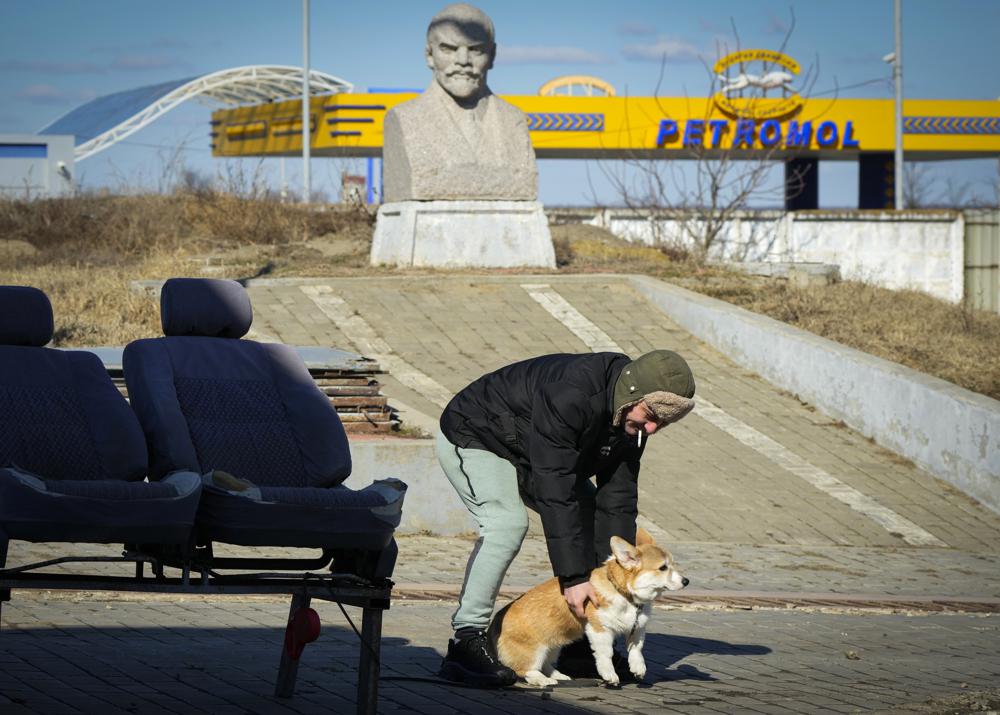Across the border from war-engulfed Ukraine, tiny, impoverished Moldova — an ex-Soviet republic now looking eagerly Westward — has watched with trepidation as the Russian invasion unfolds.
In Gagauzia, a small, autonomous part of the country that’s traditionally felt closer to the Kremlin than the West, people would normally back Russia, which they never wanted to leave when Moldova gained independence. But this time, most have trouble identifying with either side in the war.
Anna Koejoglo says she’s deeply conflicted.
“I have sisters (in Ukraine), I have nephews there, my own son is in Kyiv,” the 52-year-old said, quickly adding that her other, younger, son is studying in Russia.
“My heart is (broken), my insides are burning,” she told The Associated Press.
Koejoglo is one of Moldova’s 160,000 Gagauz, an Orthodox Christian people of Turkic origin who were settled there by the Russian Empire in the 19th century. They make up over 80% of Gagauzia’s population, but only 5% of Moldova’s 2.6 million people.
In the early 1990s, when landlocked Moldova voted to leave the Soviet Union, its Gagauz and Russian minorities wanted to stay. But unlike Russian-backed separatists in eastern Moldova who took up arms in 1992 to establish the unrecognized, breakaway Trans-Dniester area — which Russia essentially controls, maintaining some 1,500 troops there — the Gagauz in the south chose to compromise.
In 1994, they reached an agreement with the government in Moldova’s capital, Chisinau, settling for a high degree of autonomy. Still, Gagauzia has maintained a strong relationship with Russia, where many Gagauz find education and job opportunities. Its population generally opposes the pro-Western shift embraced by ethnic Moldovans who account for 75% of the country’s people.
For Peotr Sarangi, a 25-year-old Gagauz, the old ties still hold strong.
“(The) Gagauzian population supports Russia more, many remain pro-Russian,” he said.
Although Moldova is neutral militarily and has no plans to join NATO, it formally applied for EU membership when the Russian invasion began. It’s also taken in about a tenth of the more than 2.3 million Ukrainians who fled their country for safety.
Ilona Manolo, a 20-year-old Gagauz, has no qualms in laying the blame with Moscow. “I think that Russia is at fault. … I’d rather support (Ukrainian) refugees,” than Russia, she said.
There’s similar sentiment elsewhere among Moldova’s rich patchwork of ethnic minorities — even expressed by ethnic Russians who live outside the separatist region of Trans-Dniester.
One of the latter group, Nikola Sidorov, described the invasion of Ukraine as a “terrible thing.” He said he believed Russian President Vladimir Putin “went too far (and) needs to calm down.”
The 79-year-old added that the issue has become a subject of heated debates among his ethnic kin in Moldova’s second-largest city, Balti, where ethnic Russians make up some 15% of the population.
An ethnic Ukrainian who lives in Balti said her sympathies were divided.
“I’m very sorry for the people of Ukraine … but I also feel sorry for Russians,” said Iulia Popovic, 66. “I understand that it is all (happening because of) politics and that the situation is very difficult.”
(AP)











